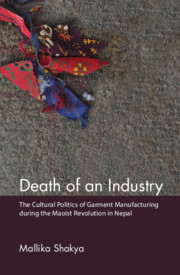 Death of an Industry
Death of an Industry Book contents
- Frontmatter
- Dedication
- Contents
- Figures and Table
- Abbreviations
- Key Names
- Acknowledgements
- 1 Situating the Idea: Industry, Society and Development
- 2 Nepal and Garments
- 3 A Garment Industry Ecosystem
- 4 The Normality of Garment Making
- 5 The MFA Expiry: A Garment Tsunami
- 6 Workers and Unions: Ethnicity and Class
- 7 Reconstituting the Garment Afterlife
- Bibliography
- Index
5 - The MFA Expiry: A Garment Tsunami
Published online by Cambridge University Press: 08 July 2018
- Frontmatter
- Dedication
- Contents
- Figures and Table
- Abbreviations
- Key Names
- Acknowledgements
- 1 Situating the Idea: Industry, Society and Development
- 2 Nepal and Garments
- 3 A Garment Industry Ecosystem
- 4 The Normality of Garment Making
- 5 The MFA Expiry: A Garment Tsunami
- 6 Workers and Unions: Ethnicity and Class
- 7 Reconstituting the Garment Afterlife
- Bibliography
- Index
Summary
The expiry of the Multi-Fibre Arrangement (MFA) in 2004 was undeniably the end of an era. Under the MFA, Nepal had received the most benefits of all South Asian countries and Nepal suffered the most when it expired. Its impact was so intense that when a tsunami hit the shores of Aceh and Phuket just five days before the MFA expired, killing thousands of Asian locals and Western tourists, many saw it as a sign that doomsday prophecies were coming true. Watching television footage of killer waves swallowing cars, roads, and houses, and seeing hordes of both local and Western mourners hopelessly searching for their loved ones in the aftermath, one garment businessman described how the tsunami had torn apart the walls dividing ‘us’ from ‘them’, and was a warning of something even bigger. This was, after all, coming from a man whose business was heading towards collapse and his entire livelihood was at stake. ‘Not even a mouse escapes a modern day jungle fire,’ another garment businessman added before launching into a tirade about ours being kali yuga, the Age of Vice, and hence destined for pralaya (catastrophe). It is easy to dismiss their doomsday thinking as a product of sour grapes, but it would be naïve to overlook the reality of how the MFA-expiry crisis fundamentally altered the Nepali garment community's views about the world and their place in it.
While the ocean tsunami struck Asian shores without warning, the Nepali garment industry's tsunami had been long in the making. The MFA was first signed in 1974, initially only for three years but was renewed easily until 1994, when the World Trade Organization (WTO) made the draconian announcement that it would be granted just ‘one last chance’ before being dismantled permanently on 31 December 2004. This came in response to reverberating calls from International Financial Institutions (IFIs) for a global free market. While the World Bank and the IMF made free trade one of the policy conditionalities under the Washington Consensus, the WTO took it upon itself to push the United States to dismantle the MFA, in order to end US engineering of the global trade of garments.
- Type
- Chapter
- Information
- Death of an IndustryThe Cultural Politics of Garment Manufacturing during the Maoist Revolution in Nepal, pp. 81 - 96Publisher: Cambridge University PressPrint publication year: 2018


